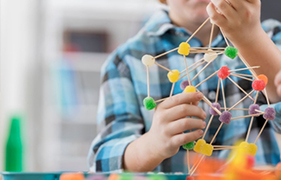How Project-Based Learning Can Promote Empathy
 In this day and age, it takes more than just problem-solving skills to face different challenges. The way we accommodate people into our lives despite our differences, it also makes us feel connected to each other and helps us to consider other people’s point of view – to mingle, share our perspective, and to be a part of the global community. Inclusion is possible when there is room for co-existence.
In this day and age, it takes more than just problem-solving skills to face different challenges. The way we accommodate people into our lives despite our differences, it also makes us feel connected to each other and helps us to consider other people’s point of view – to mingle, share our perspective, and to be a part of the global community. Inclusion is possible when there is room for co-existence.
Teaching and Learning in 21st century classrooms are all about integrating diversity and develop cultural literacy within students. When we create opportunities for our students to build a mindset of inclusion and open heartedness, we make room for unity and humanity.
Project-based learning is one such way to incorporate learning that allows us to nudge empathy within students, empathy being the source of developing kindness and compassion, it can also our children to anchor their feelings and emotion in healthier ways. Empathy is an act of understanding one another, being consciously connected to our own experiences and thoughts as well as the others.
We as educators must understand we cannot teach students empathy like we teach problem-solving skills or social skills to them. Empathy –an ephemeral quality that can only come from experience.
Although is more of characteristics and certain people can be innately empathetic by nature. But it can also first come from "nurture" – what we receive from our parents and family. And as we grow and keep experiencing life events, we either encode empathy as part of our nature or we feel a disconnection in this aspect. The only way we can guide our students to embrace empathy is by creative learning situations to help them tap into humanness.
How Empathy Skills Can Benefits School Students!
- Skills such as observation, communication, decision-making, and interpersonal relationship are correlated to empathy. When students use empathy as their inner guide, these skills can reflect quality and humanness, it can also help them to build positive relationships with each-others.
- It can allow students to build positive classroom culture and maintain good relationships with the teacher and peers.
- Students can integrate their empathy skills towards positive collaboration and teamwork.
- It can help students to cultivate patience and tolerance within, thereby decrease bullying and discrimination in the school environment.
- Students will become more accepting of different backgrounds, races, and cultures, enabling them to learn how to co-exist with compassion.
How Project-Based Learning (PBL) Is Pro Empathy Skill?
A well-designed classroom project can help teaching professionals to incorporate learning situations where students can grow their thinking from a perspective of empathy. Project-based learning is known for its multidisciplinary approach. It is also important to consider that PBL not only allows students to learn collaboration, problem-solving, and critical thinking. It can encourage students to develop empathy by deepening their understanding of, for instance, cross-culture and history.
John Dewey in his theory of experiential learning (Dewey, 1986) says, integrating empathy in project-based learning is where students perform observation and interview sessions with the target user to gain a deep understanding of the project.
Compared to theory-based learning, project-based learning can help students to learn through experience. when the teacher can integrate empathy in project-based learning, students get the opportunity to form ideas and knowledge-based of inquiry, it creates a scope for the learners to learn by themselves and grow their perspective. Therefore, fosters humanness and people-oriented attitude to form their conclusion in decision making.
Keeping in mind we are raising the next generation, and a mindset of 21st century classrooms, project-based learning also promotes imagination and innovation within students which can help them solve problems not just challenges surrounding them, but also the issues faced by people around the world.
Wrapping Up
Project-based learning has wider scope in encouraging students to embody their empathetic side. Using skills to integrate empathy in Teaching and Learning not just helps to create a positive learning environment it also helps learners to navigate their feelings, seek justice, and to understand the meaning of unity. Project-based learning approach alongside content knowledge can amplify the power of empathy and connection.



